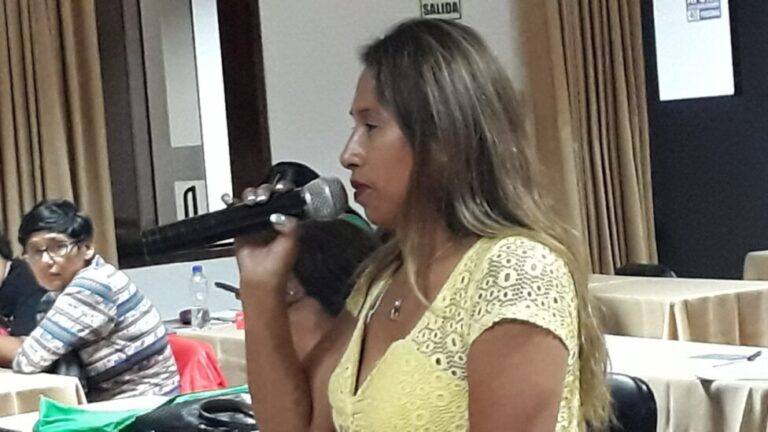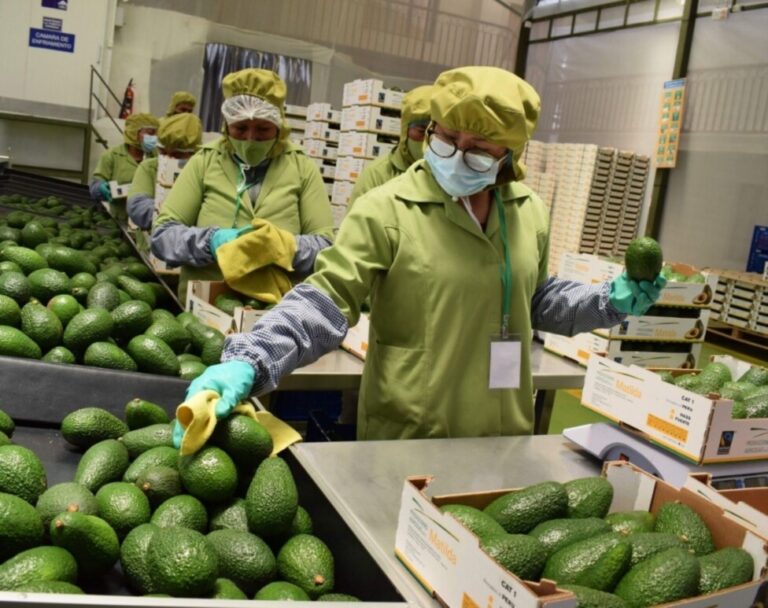[ad_1]

LIMA, Might 31 (IPS) – Peru’s agro-export business is rising steadily and reached file ranges in 2022. However this has not had a positive impression on human growth on this South American nation, the place excessive ranges of inequality, poverty, childhood anemia and malnutrition persist, in addition to complaints in regards to the poor high quality of employment within the sector.
Exports of agricultural merchandise corresponding to blueberries, grapes, tangerines, artichokes and asparagus generated 9.8 billion {dollars} in income in 2022 – 12 % greater than the 2021 whole, as reported in February by the Ministry of Overseas Commerce and Tourism.
Agricultural exports characterize 4 % of GDP on this Andean nation, the place mining and fishing are the principle financial actions.
“The rise in income from agricultural exports has not introduced human growth: anemia and tuberculosis are at worrying ranges and now dengue fever is skyrocketing,” Rosario Huallanca, a consultant of the non-governmental Ica Human Rights Commission (Codeh Ica), which has labored for 41 years in that division of southwestern Peru, instructed IPS.
Ica and two different departments alongside the nation’s Pacific coast, La Libertad and Piura, are leaders within the sector, accounting for almost 50 % of agricultural exports on this nation of 33 million folks, which regardless of this increase stays stricken by inequality, mirrored by excessive ranges of poverty and informality and precariousness in employment.
Financial poverty affected 27.5 % of the nation’s 33 million inhabitants in 2022, in line with the National Institute of Statistics and Informatics. It is a seven proportion level improve over the pre-pandemic interval. The variety of poor folks was estimated at 9,184,000 final 12 months, 600,000 greater than in 2021.
Ica, which has a complete of 850,765 inhabitants, is likely one of the departments with the bottom financial poverty charges, 5 %, as a result of it has full employment, largely because of the agro-export increase of the final twenty years.
Huallanca stated the variety of agro-export firms is estimated at 320, with a complete of 120,000 workers, who come from completely different elements of the nation.
What stands out, she stated, is that 70 % of the entire variety of staff within the sector are girls, who’re valued for his or her positive motor expertise in dealing with vegatables and fruits.
Though a portion of the employees of some firms are within the casual sector, there aren’t any clear numbers, the professional identified.
However there are alarming figures accessible: greater than six % of youngsters underneath 5 undergo from continual malnutrition, and anemia impacts 33 % of youngsters between six and 35 months of age.
“With the kind of job we’ve, we can not take our kids to their progress checkups, we will’t miss work as a result of they don’t pay you for those who don’t present up, we cry in silence due to our nervousness,” 42-year-old Yanina Huamán, who has labored within the agro-export sector for 20 years to help her three youngsters, instructed IPS.
The 2 oldest are in center and better training and her youngest remains to be in main faculty. “I’m each mom and father to my youngsters. With my work I’m giving them an training and I’ve manged to safe a house of my very own, however it’s precarious, the bedrooms don’t have roofs but, for instance,” she stated.
Huamán is secretary for girls’s affairs within the union of the corporate the place she works, a place she was appointed to in November 2022. From that submit, she hopes to assist result in enhancements in entry to healthcare for feminine staff, who both postpone going to the physician when they should, or obtain poor medical consideration within the social safety well being system “the place they solely give us capsules.”
Ica at present has the very best variety of deaths from dengue fever, a viral illness that led the federal government of Dina Boluarte to declare a 90-day well being emergency in 13 of the nation’s 24 departments a few weeks in the past.
Not solely that, it has the historical past of being the division with the very best stage of deaths from Covid-19: 901 deaths per 100,000 inhabitants, exceeding the nationwide common of 630 per 100,000. “The well being system right here doesn’t work,” commerce unionist Huamán stated bluntly.

Working situations harder for girls
The shortage of high quality employment and the poor recognition of labor rights, exacerbated by the pandemic, prompted a strike in November 2020 that started in Ica and unfold to the northern coastal space of ??La Libertad and Piura.
Their calls for included a minimal dwelling wage of 70 soles (19 {dollars}) a day, social advantages corresponding to compensation and raises for size of service, and recognition of the suitable to kind unions.
Grouped collectively within the not too long ago created Ica Staff’ Union Agro-exports Battle Committee, which represents informal and seasonal staff, they went to Congress in Lima to demand adjustments within the present laws.
Susan Quintanilla, 39, initially from the central Andean division of Ayacucho, is the overall secretary of the union. She arrived in Ica in 2014 after separating from her husband. She got here along with her two youngsters, a lady and a boy, for whom she hoped for a future with higher alternatives.
After working as a harvester within the fields, and cleansing and packing fruit on the plant, she determined to work on a piecework foundation, as a result of that manner she may earn extra and save up for occasions when the businesses wanted much less labor.
“It was extremely laborious,” she instructed IPS. “I would go away house at 10 within the morning and depart work at three or 4 within the wee hours of the subsequent morning to be there to get my children prepared for varsity. I used to be 29 or 30 years previous, I used to be younger, however I noticed older girls with ache of their our bodies, their arms and their ft because of the postures we had at work, however they continued as a result of they’d no different possibility.
“I noticed many injustices within the agro-export firms,” she added. “They made you are feeling that they have been doing you a favor by providing you with work, they needed you to maintain your head down, they shouted at and humiliated folks, they made them really feel depressing. I protested, raised my voice, they usually did not hearth me as a result of I used to be a excessive efficiency employee they usually wanted me. The state of affairs has modified somewhat due to our struggles, however it hasn’t come without spending a dime.”
The late 2020 protests led to the approval on Dec. 31 of that 12 months of Law No. 31110 on agricultural labor and incentives for the agricultural and irrigation sector, geared toward guaranteeing the rights of staff within the agro-export and agroindustrial sectors.
However in Quintanilla’s view, the regulation discriminates in opposition to non-permanent staff who make up the most important a part of the workforce within the sector, for the reason that preferential proper to hiring established within the fourth article of the regulation shouldn’t be revered.
“Nor have they acknowledged the differentiated cost of our social advantages they usually embrace them within the every day wage that’s calculated at 54 soles (somewhat greater than 14 {dollars}): it’s not truthful,” she complained.
On the identical time, she harassed that the agro-export work is tougher on girls as a result of they’re those answerable for elevating their youngsters. “We reside in a sexist society that burdens us with all the care work,” Quintanilla stated.
She additionally defined that as a result of a number of of the businesses are so distant, it takes staff longer to get to work, which suggests they’re away from house for as much as twelve hours a day. “We go to work with the nervousness that we’re leaving our kids liable to the hazards of life, we can’t be with them as we wish, which damages us emotionally.”
Added to this, she stated, are the horrible working situations, corresponding to the truth that the bogs are removed from the areas the place they work, as a lot as three blocks away, or in unsanitary situations, which leads girls to keep away from utilizing them, to the detriment of their well being.

Agro-export firms and human rights
Huallanca stated that Codeh Ica was selling the creation of an area of various stakeholders in order that the National Business and Human Rights Plan, a public coverage geared toward guaranteeing that financial actions enhance folks’s high quality of life, is fulfilled within the division. 5 unions from Ica and the Chamber of Commerce, Trade and Tourism take part on this initiative.
“We’ve made an infinite effort and we hope that on Jun. 16 it is going to be formally created by the Ministry of Justice and Human Rights, the governing physique for this coverage,” she stated.
Within the meantime, she added, “we’ve helped deliver collectively girls concerned within the agro-export sector, who’ve developed a rights agenda that has been given form on this multi-stakeholder house and we hope it is going to be taken under consideration.”
© Inter Press Service (2023) — All Rights ReservedOriginal source: Inter Press Service
[ad_2]

